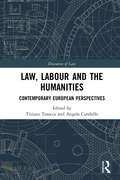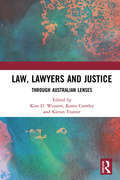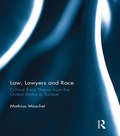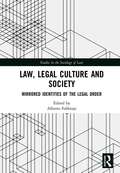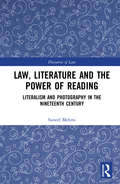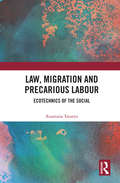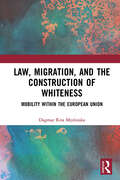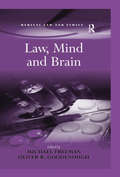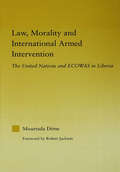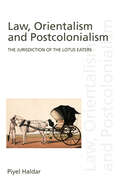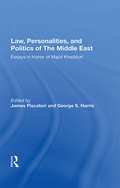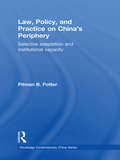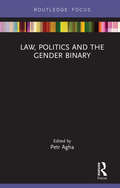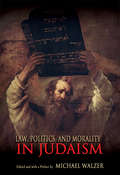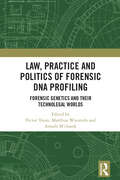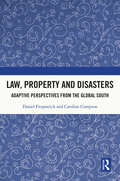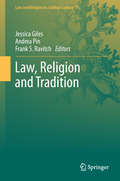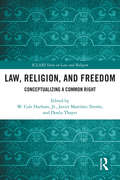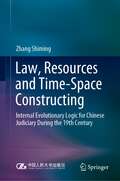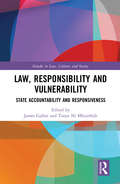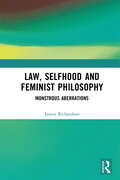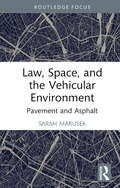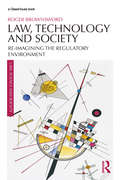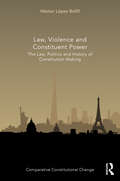- Table View
- List View
Law, Labour and the Humanities: Contemporary European Perspectives
by Angela Condello Tiziano ToraccaThe ontology of work and the economics of value underpin the legal institution, with the existence of modern law predicated upon the subject as labourer. In contemporary Europe, labour is more than a mere economic relationship. Indeed, labour occupies a central position in human existence: since the industrial revolution, it has been the principal criterion of reciprocal recognition and of universal mobilization. This multi-disciplinary volume analyses labour and its depictions in their interaction with the latest legal, socio-economic, political and artistic tendencies. Addressing such issues as deregulation, flexibility, de-industrialization, the pervasive enlargement of markets, digitization and virtual relationships, social polarisation and migratory fluxes, this volume engages with the existential role played by labour in our lives at the conjunction of law and the humanities. This book will be of interest to law students, legal philosophers, theoretical philosophers, political philosophers, social and political theorists, labour studies scholars, and literature and film scholars.
Law, Lawyers and Justice: Through Australian Lenses
by Kieran Tranter Karen Crawley Kim D. WeinertThis book engages with the place of law and legality within Australia’s distinctive contribution to global televisual culture. Australian popular culture has created a lasting legacy – for good or bad – of representations of law, lawyers and justice ‘down under’. Within films and television of striking landscapes, peopled with heroes, antiheroes, survivors and jokers, there is a fixation on law, conflicts between legal orders, brutal violence and survival. Deeply compromised by the ongoing violence against the lives and laws of First Nation Australians, Australian film and television has sharply illuminated what it means to live with a ‘rule of law’ that rules with a legacy, and a reality, of deep injustice. This book is the first to bring together scholars to reflect on, and critically engage with, the representations and global implications of law, lawyers and justice captured through the lenses of Australian film, television and social media. Exploring how distinctively Australian lenses capture uniquely Australian images and narratives, the book nevertheless engages these in order to provide broader insights into the contemporary translations and transmogrifications of law and justice.
Law, Lawyers and Race: Critical Race Theory from the US to Europe
by Mathias MöschelCritical Race Theory (CRT) is virtually unheard of in European scholarship, especially among legal scholars. Law, Lawyers and Race: Critical Race Theory from the United States to Europe endeavours to fill this gap by providing an overview of the definition and consequences of CRT developed in American scholarship and describing its transplantation and application in the continental European context. <P><P> The CRT approach adopted in this book illustrates the reasons why the relationship between race and law in European civil law jurisdictions is far from anodyne. Law plays a critical role in the construction, subordination and discrimination against racial minorities in Europe, making it comparable, albeit in slightly different ways, to the American experience of racial discrimination. Anti-Semitism, Islamophobia, anti-Roma and anti-Black racism constitute a fundamental factor, often tacitly accepted, in the relationship between law and race in Europe. Consequently, the broadly shared anti-race and anti-racist position is problematic because it acts to the detriment of victims of racism while privileging the White, Christian, male majority. <P><P> This book is an original exploration of the relationship between law and race. As such it crosses the disciplinary divide, furthering both legal scholarship and research in Race and Ethnicity Studies.
Law, Legal Culture and Society: Mirrored Identities of the Legal Order (Studies in the Sociology of Law)
by Alberto FebbrajoThis volume addresses the pluralistic identity of the legal order. It argues that the mutual reflexivity of the different ways society perceives law and law perceives society eclipses the unique formal identity of written law. It advances a distinctive approach to the plural ways in which legal cultures work in a modern society, through the metaphor of the mirror. As a mirror of society, it distinguishes between the structure and function of legal culture within the legal system, and the external representation of law in society. This duality is further problematized in relation to the increasing transnationalisation of law. Based on a multi-level interpretation of the concept of legal culture, the work is divided into three parts: the first addresses the mutual reflections of social and legal norms that support a pluralist representation of internal legal cultures, the second concentrates on the external legal cultures that constantly enable pragmatic adjustments of the legal order to its social environment, and the third concludes the book with a theoretical discussion of the issues presented.
Law, Literature and the Power of Reading: Literalism and Photography in the Nineteenth Century
by Suneel MehmiAt the intersection of law, literature and history, this book interrogates how a dominant contemporary idea of law emerged out of specific ideas of reading in the nineteenth century. Reading shapes our identities. How we read shapes who we are. Reading also shapes our conceptions of what the law is, because the law is also a practice of reading. Focusing on the works of key Victorian writers closely associated with legal practice, this book addresses the way in which the identity of the reader of law has been modelled on the identity of the political elite. At the same time, it shows how other readers of law have been marginalized. The book thus shows how a construction of the law has emerged from the ordering of a power that discriminates between different readers and readings. More specifically, and in response to the emerging media of photography – and, with it, potentially subversive ideas of exposure and visibility – the book shows that there have been dominant, hidden and unrecognised guides to legal reading and to legal thought. And in making these visible, the book also aims to make them contestable. This secret history of law will appeal to legal historians, legal theorists, those working at the intersection of law and literature and others with interests in law and the visual.
Law, Migration and Precarious Labour: Ecotechnics of the Social
by Anastasia TatarynProviding a radical new approach to labour migration, this book challenges the prevailing legal and political construction of the figure of the irregular migrant labourer, whilst at the same time reimagining this irregularity as the basis of an alternative, post-capitalist, sociality. The text draws on the work of contemporary philosopher Jean-Luc Nancy, and more specifically his term ‘ecotechnics’, in order to examine how economic, political, and juridical norms deny the full legal status of certain people who are deemed to be irregular. This ostensible irregularity is revealed as a regular feature of labour market practice, and a necessary support for the conceptual foundations of capitalist legality. As this book shows, however, this legality – and with it, the technological subordination of life to the circulation of capital as if this were the only possibility for our being in the world – is not insurmountable. The book’s consideration of the figure of the irregular migrant labourer comes to provide an alternative basis for reimagining our relationship not only with migration and with labour itself, but ultimately with each other. This powerful analysis of contemporary labour migration is of considerable interest to legal and political theorists, philosophers, labour lawyers, migration experts, and others with theoretical, political, or policy interests in this area.
Law, Migration, and the Construction of Whiteness: Mobility Within the European Union
by Dagmar Rita MyslinskaThis book addresses the hidden dynamics of race within the European Union.Brexit supporters’ frequent targeting of European Union (EU) movers, especially those from Central and Eastern Europe, has been popularly assumed as at odds with the EU project’s foundations based on equality and inclusion. This book dispels that notion. By interrogating the history, wording, omissions, assumptions and applications of laws, policies and discourses pertinent to mobility and equality, the argument developed throughout the book is that the parameters of CEE nationals’ status within the EU have been closely circumscribed, in line with the entrenched historical positioning of the west as superior to the east. Engaging current legal, economic, political and moral issues--against the backdrop of Brexit and contestations over EU integration and globalisation--this work opens avenues of thought to better understand law’s role in producing and sustaining social stratifications. Europe is a postcolonial space, as this book demonstrates. By addressing fractures within the construct of whiteness that are based on ethnicity, class and migrant status, the book also provides a theoretically nuanced, and politically useful, understanding of contemporary European racisms.This book will appeal to scholars, students and others interested in migration, EU integration and EU citizenship, equality law, race and ethnicity, social policy, and postcolonialism.
Law, Mind and Brain (Medical Law and Ethics)
by Michael Freeman Oliver R. GoodenoughOver the past 20 years, cognitive neuroscience has revolutionized our ability to understand the nature of human thought. Working with the understandings of traditional psychology, the new brain science is transforming many disciplines, from economics to literary theory. These developments are now affecting the law and there is an upsurge of interest in the potential of neuroscience to contribute to our understanding of criminal and civil law and our system of justice in general. The international and interdisciplinary chapters in this volume are written by experts in criminal behaviour, civil law and jurisprudence. They concentrate on the potential of neuroscience to increase our understanding of blame and responsibility in such areas as juveniles and the death penalty, evidence and procedure, neurological enhancement and treatment, property, end-of-life choices, contracting and the effects of words and pictures in law. This collection suggests that legal scholarship and practice will be increasingly enriched by an interdisciplinary study of law, mind and brain and is a valuable addition to the emerging field of neurolaw.
Law, Morality, and International Armed Intervention: The United Nations and ECOWAS (African Studies)
by Mourtada DemeInternational law is often manipulated in the debate about humanitarian intervention. The Liberian case provides an opportunity to challenge the UN and The Economic Community of West African States' (ECOWAS') new approach. ECOWAS and the UN's justifications for moving away from the current norms are flawed. No enlightened person would disagree with the values of peace, democracy, human rights, and economic development. This book, however, explores whether these goals be pursued within the current framework or outside it.
Law, Orientalism and Postcolonialism: The Jurisdiction of the Lotus-Eaters
by Piyel HaldarFocusing on the ‘problem’ of pleasure Law, Orientalism and Postcolonialism uncovers the organizing principles by which the legal subject was colonized. That occidental law was complicit in colonial expansion is obvious. What remains to be addressed, however, is the manner in which law and legal discourse sought to colonize individual subjects as subjects of law. It was through the permission of pleasure that modern Western subjects were refined and domesticated. Legally sanctioned outlets for private and social enjoyment instilled and continue to instil within the individual tight self-control over behaviour. There are, however, states of behaviour considered to be repugnant to, and in excess of, modern codes of civility. Drawing on a broad range of literature, (including classical jurisprudence, eighteenth century Orientalist scholarship, early travel literature, and nineteenth century debates surrounding the rule of law), yet concentrating on the experience of British India, the argument here is that such excesses were deemed to be an Oriental phenomenon. Through the encounter with the Orient and with the fantasy of its excess, Piyel Haldar concludes, the relationship between the subject and the law was transformed, and must therefore be re-assessed.
Law, Personalities, And Politics Of The Middle East: Essays In Honor Of Majid Khadduri
by James Piscatori George S. HarrisThis book is a tribute to Majid Khadduri and focuses on the three principal fields of his own work: Islamic and international law; ideas and personalities in the Arab world; and politics and diplomacy in the Middle East.
Law, Policy, and Practice on China's Periphery: Selective Adaptation and Institutional Capacity (Routledge Contemporary China Series)
by Pitman B. PotterThis book examines the Chinese government’s policies and practices for relations with the Inner Periphery areas of Tibet, Xinjiang, and Inner Mongolia, and the Outer Periphery areas of Hong Kong and Taiwan focusing on themes of political authority, socio-cultural relations, and economic development. China’s history may be seen as one of managing the geographic periphery surrounding China proper. Successive imperial, republican, and communist governments have struggled to maintain sovereignty over the regions surrounding the great river valleys of China. The importance of the periphery is no less real today, concerns over national security, access to natural resources, and long-held concerns about relations between Han and other ethnic groups continue to dominate Chinese law, policy and practice regarding governance in the Inner Periphery regions of Inner Mongolia, Xinjiang, and Tibet. In the Outer Periphery, Beijing sees engagement with the outside world (particularly the West) as inextricably tied to Chinese sovereignty over former foreign colonies of Hong Kong and Taiwan. Using the case study of national integration to indicate how policies are articulated and implemented through law and political-legal institutions, this book will be of interest to students and scholars of the peripheral regions. It will also appeal to academic and policy communities interested in legal reform in China
Law, Politics and the Gender Binary
by Petr AghaThe distinction between male and female, or masculinity and femininity, has long been considered to be foundational to society and the organization of its institutions. In the last decades, the massive literature on gender has challenged this discursive construction. Gender has been disassembled and reassembled, variously considered as social practice, performance, ideology. Yet the binary relationship ‘man/woman’ continues to be a characteristic trait of Western societies. This book gathers together contributions by experts in various fields – including law, sociology, philosophy and anthropology – to pin down the relationship between institutions and the gender binary. Centrally, it examines the way in which the present-day gender binary is shored up by the conceptualization and regulation of sex and gender at societal and institutional levels. Based on this examination, it tackles the issue of what the practices and processes of subjectivation are that preserve this binary distinction as the foundation of gender. Each of the chapters discusses this pressing question with a view to considering whether current equality policies challenge hierarchical and hegemonic understandings of gender or are the residue of a sexist understanding of gender. This analysis then paves the way for a more general and crucial question: whether institutions can, or should, contribute to the process of deconstructing the gender binary.
Law, Politics, and Morality in Judaism (Ethikon Series in Comparative Ethics)
by Michael WalzerJewish legal and political thought developed in conditions of exile, where Jews had neither a state of their own nor citizenship in any other. What use, then, can this body of thought be today to Jews living in Israel or as emancipated citizens in secular democratic states? Can a culture of exile be adapted to help Jews find ways of being at home politically today? These questions are central in Law, Politics, and Morality in Judaism, a collection of essays by contemporary political theorists, philosophers, and lawyers. How does Jewish law accommodate--or fail to accommodate--the practice of democratic citizenship? What range of religious toleration and pluralism is compatible with traditional Judaism? What forms of coexistence between Jews and non-Jews are required by shared citizenship? How should Jews operating within halakha (Jewish law) and Jewish history judge the use of force by modern states? The authors assembled here by prominent political theorist Michael Walzer come from different points on the religious-secular spectrum, and they differ greatly in their answers to such questions. But they all enact the relationship at issue since their answers, while based on critical Jewish texts, also reflect their commitments as democratic citizens. The contributors are Michael Walzer, David Biale, the late Robert M. Cover, Menachem Fisch, Geoffrey B. Levey, David Novak, Aviezer Ravitzky, Adam B. Seligman, Suzanne Last Stone, and Noam J. Zohar.
Law, Practice and Politics of Forensic DNA Profiling: Forensic Genetics and their Technolegal Worlds
by Matthias Wienroth Victor Toom Amade M’charekThis collection reviews developments in DNA profiling across jurisdictions with a focus on scientific and technological developments as well as their political, ethical, and socio-legal aspects. Written by leading scholars in the fields of social studies of forensic science, science and technology studies and socio-legal studies, the book provides state-of-the-art analyses of forensic DNA practices in a diverse range of jurisdictions, new and emerging forensic genetics technologies and issues of legitimacy. The work articulates the various forms of technolegal politics involved in the everyday, standardised and emerging practices of forensic genetics and engages with the most recent scholarly and policy literature. In analyses of empirical cases, and by taking into account the most recent technolegal developments, the book explores what it means to live in a world that is increasingly governed through anticipatory crime control and its related risk management and bio-surveillance mechanisms, which intervene with and produce political and legal subjectivities through human bodies in their DNA. This volume is an invaluable resource for those working in the areas of social studies of forensic science, science and technology studies, socio-legal studies, sociology, anthropology, ethics, law, politics and international relations.
Law, Property and Disasters: Adaptive Perspectives from the Global South
by Daniel Fitzpatrick Caroline ComptonThis book re-considers property law for a future of environmental disruption. As slogans such as “build the wall” or “stop the boats” affect public policy, there are counter-questions as to whether positivist or statist notions of property are fit for purpose in a time of human mobility and environmental disruption. State-centric property laws construct legal fictions of sovereign control over land, notwithstanding the persistent reality of informal settlements in many parts of the Global South. In a world affected by catastrophic disasters, this book develops a vision of adaptive governance for property in land based on a critical re-assessment of state-centric property law. This book will appeal to a broad readership with interests in legal theory, property law, adaptive governance, international development, refugee studies, postcolonial studies, and natural disasters.
Law, Religion and Tradition (Law and Religion in a Global Context #1)
by Frank S. Ravitch Jessica Giles Andrea PinThis book explores different theories of law, religion, and tradition, from both a secular and a religious perspective. It reflects on how tradition and change can affect religious and secular legal reasoning, identifying the patterns of legal evolution within religious and secular traditions.It is often taken for granted that, even in law, change corresponds and correlates to progress – that things ought to be changed and they will necessarily get better. There is no doubt that legal changes over the centuries have made it possible to enhance the protection of individual rights and to somewhat contain the possibility of tyranny and despotism. But progress is not everything in law: stability and certainty lie at the core of the rule of law. Similarly, religions and religious laws could not survive without traditions; and yet, they still evolve, and their evolution is often intermingled with secular law.The book asks (and in some ways answers) the questions: What is the role of tradition within religions and religious laws? What is the impact of religious traditions on secular laws, and vice-versa? How are the elements of tradition to be identified? Are they the same within the secular and the religious realm? Do secular law and religious law follow comparable patterns of change? Do their levels of resilience differ significantly? How does the history of religion and law affect changes within religious traditions and legal systems?The overall focus of the book addresses the extent to which tradition plays a role in shaping and re-shaping secular and religious laws, as well as their mutual boundaries.
Law, Religion, and Freedom: Conceptualizing a Common Right (ICLARS Series on Law and Religion)
by W. Cole Durham, Jr., Javier Martínez-Torrón, and Donlu ThayerThis book examines major conceptual challenges confronting freedom of religion or belief in contemporary settings. The volume brings together chapters by leading experts from law, religious studies, and international relations, who provide perspectives from both sides of the Atlantic. At a time when the polarization of ‘culture wars’ is aggravating tensions between secular and religious views about accommodating the conscientious claims of individuals and groups, and when the right to freedom of religion itself is facing misunderstanding and erosion, the work provides welcome clarity and depth. Some chapters adopt a primarily conceptual and historical approach; others analyze particular difficulties or conflicts that have emerged in European and American jurisdictions, along with concrete applications and recommendations for the future. The book will be a valuable resource for students, academics, and policy-makers with an interest in law, religion, and human rights.
Law, Resources and Time-Space Constructing: Internal Evolutionary Logic for Chinese Judiciary During the 19th Century
by Zhang ShimingThis book studies the judicial evolution of the Qing Dynasty. It sums up the changes from six major aspects: 1. Banfang(班房)emerged in the late Qianlong period; 2. The opening of capital appeals(京控)early in Jiaqing’s reign; 3. The consular jurisdiction was established during Daoguang’s reign; 4. The execution on the spot (就地正法)was started in Daoguang and Xianfeng periods; 5. The introduction of fashenju (发审局,a interrogatory court) happened during Tongzhi’s reign; 6. Late in Guangxu’s reign, banishment was abolished, and reforms were made for prisons. In the past, people did not have a comprehensive understanding of these big changes. From the perspective of legal culture, scholars often criticize traditional Chinese law focuses on criminal law while ignores civil law in terms of legal culture, but this situation can be explained in part by the inadequate allocation of resources and authoritarian resources in traditional societies. Using a large number of archives and precious materials such as private notes that were not noticed by academics in the past, this book adopts the research path of new historical jurisprudence to explore the inner logic of judicial evolution in the Qing Dynasty, focusing on the triangular connection between legal rules, resources, and temporal and spatial constructions, which is an important contribution to the study of traditional Chinese law.
Law, Responsibility and Vulnerability: State Accountability and Responsiveness (Gender in Law, Culture, and Society)
by James Gallen Tanya Ní MhuirthileThis book addresses how law and public policy cause or exacerbate vulnerability in individuals and groups. Bringing together scholars, judges and practitioners, it identifies how individuals and groups can become vulnerabilised through the operation of law, and examines how the State can acknowledge and remedy that impact. The book offers not only a theoretical, ethical and normative conception of vulnerability in law, but also an evaluation of the diverse practices of responding to vulnerability in law through accountability mechanisms and public campaigns. The analysis of vulnerability contained in this volume is enhanced by the common use of Ireland as a case study. Despite the robust rights protections available at national, regional and international level, Ireland remains a State where at risk people have experienced vulnerability across a range of thematic areas, such as criminal law, migration and asylum, historical abuse, LGBTI rights and austerity. Drawing on comparative analyses and a consideration of the role of international law in domestic settings, this book offers a comparison of diverse national and transnational attempts to ensure State accountability and responsiveness to legally created vulnerabilities. The book demonstrates lessons learned from theory and practice regarding how vulnerability can be experienced by individuals and groups, structured by law and addressed through legal and political action. This book will be of considerable interest to socio-legal and "law and society" scholars, as well as others working in international human rights, jurisprudence, philosophy, legal theory, political theory, feminist theory, and ethics.
Law, Science, Liberalism and the American Way of Warfare
by Stephanie Carvin Michael John WilliamsFounded and rooted in Enlightenment values, the United States is caught between two conflicting imperatives when it comes to war: achieving perfect security through the annihilation of threats; and a requirement to conduct itself in a liberal and humane manner. In order to reconcile these often clashing requirements, the US has often turned to its scientists and laboratories to find strategies and weapons that are both decisive and humane. In effect, a modern faith in science and technology to overcome life's problems has been utilized to create a distinctly 'American Way of Warfare'. Carvin and Williams provide a framework to understand the successes and failures of the US in the wars it has fought since the days of the early Republic through to the War on Terror. It is the first book of its kind to combine a study of technology, law and liberalism in American warfare.
Law, Selfhood and Feminist Philosophy: Monstrous Aberrations
by Janice RichardsonAt the intersection of law, feminism and philosophy, this book analyses the ways in which certain bodies and ‘selves’ continue to be treated as monstrous aberrations from the ‘ideal’ figure or norm. Employing contemporary feminist philosophy to rethink accepted legal ideas, the book is divided into three sections. The first focuses on the different relational ontologies of philosophers Adriana Cavarero and Christine Battersby – also considering their work via a third term: Spinoza. The second turns to diverse feminist engagements with the social contract theorists. The third section employs insights from throughout the book to focus more explicitly on law – and, in particular privacy law and the so-called ‘wrongful birth’ cases. Bringing together more than twenty years of sustained reflection, this book offers an insightful account of how contemporary feminist philosophy can contribute to a richer understanding of law. It will be of enormous interest to scholars and students working in the areas of legal theory, feminist thought and philosophy.
Law, Space, and the Vehicular Environment: Pavement and Asphalt
by Sarah MarusekThis book examines the paved road as a liminal space and legal frontier for enlivened, everyday struggles over property, power, and place/definition. Through pavement itself and the pavement-based practices of pavementalities and pavementeering, the road is legally framed as a place for movement. Paved terrain is a site of dynamism between law and place that engenders the road as legal metaphor by calling forth the kinetic notion of jurisprudence in which law can be understood through the fluidity of everyday life. In Western (and particularly American) society, roads are a material locus of governance, in which rights of way are determined, communicated, and enforced. However, roads also constitute a site of resistance or disruption, beyond regulation. Addressing phenomena such as travel, political protest, public memory, and community governance, this book explores the paved medium of asphalt as a complex surface for legality that constitutively frames order against disorder involving jurisdiction tensions, property ownership, and cultural identities in vehicular environments. The target audience of this book are those students and scholars who consider how law works in society, whether through frameworks of (auto) mobility and legal geography or through the interdisciplinary approaches of legal semiotics, legal culture, and/or new materialism.
Law, Technology and Society: Reimagining the Regulatory Environment (Law, Science and Society)
by Roger BrownswordThis book considers the implications of the regulatory burden being borne increasingly by technological management rather than by rules of law. If crime is controlled, if human health and safety are secured, if the environment is protected, not by rules but by measures of technological management—designed into products, processes, places and so on—what should we make of this transformation? In an era of smart regulatory technologies, how should we understand the ‘regulatory environment’, and the ‘complexion’ of its regulatory signals? How does technological management sit with the Rule of Law and with the traditional ideals of legality, legal coherence, and respect for liberty, human rights and human dignity? What is the future for the rules of criminal law, torts and contract law—are they likely to be rendered redundant? How are human informational interests to be specified and protected? Can traditional rules of law survive not only the emergent use of technological management but also a risk management mentality that pervades the collective engagement with new technologies? Even if technological management is effective, is it acceptable? Are we ready for rule by technology? Undertaking a radical examination of the disruptive effects of technology on the law and the legal mind-set, Roger Brownsword calls for a triple act of re-imagination: first, re-imagining legal rules as one element of a larger regulatory environment of which technological management is also a part; secondly, re-imagining the Rule of Law as a constraint on the arbitrary exercise of power (whether exercised through rules or through technological measures); and, thirdly, re-imagining the future of traditional rules of criminal law, tort law, and contract law.
Law, Violence and Constituent Power: The Law, Politics And History Of Constitution Making (Comparative Constitutional Change)
by Héctor López BofillThis book challenges traditional theories of constitution-making to advance an alternative view of constitutions as being founded on power which rests on violence. The work argues that rather than the idea of a constitution being the result of political participation and deliberation, all power instead is based on violence. Hence the creation of a constitution is actually an act of coercion, where, through violence, one social group is able to impose itself over others. The book advocates that the presence of violence be used as an assessment of whether genuine constitutional transformation has taken place, and that the legitimacy of a constitutional order should be dependent upon the absence of killing. The book will be essential reading for academics and researchers working in the areas of constitutional law and politics, legal and political theory, and constitutional history.
